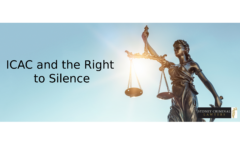No Right to Silence in ICAC Investigations

The right to silence has been a cornerstone of the Australia criminal justice system up until recently, when several legislative amendments have led to it’s dilution.
Nowadays, adverse inferences can be drawn from a person’s decision not to answer questions in certain circumstances.
But did you know that if you are called before the Independent Commission Against Corruption (ICAC), you don’t have the right to silence at all?
Under the ICAC Act the right was removed for any investigations undertaken by the Commission.
Section 37 provides that any witness that is summoned to attend does not have a right to refuse to answer questions that are relevant to the investigation, nor to refuse to produce any relevant document or thing that is required.
The decision to eliminate the right to silence for ICAC investigations was made on the basis that it is not a court.
Significantly, section 26 of the ICAC Act states that any answers given after an objection will not be permissible as evidence in court proceedings against that person.
However, this protection only applies if a person objects before answering a question or producing a document or other piece of evidence.
The fact that a person has to know about this immunity first in order to use it puts people without legal representation at a significant disadvantage, as they may not be aware of until it is too late.
The proposed investigation of highly-respected criminal lawyer Margaret Cunneen is an example of the potential reach of ICAC’s investigatory powers.
Ms Cunneen was accused of advising her son’s girlfriend to fake chest pains after being in a car accident in order to avoid police from obtaining her blood alcohol level.
While ICAC is supposed to investigate public bodies, it proposes to investigate the conduct of two private people – Stephen Wylie, the son of Cunneen, and his girlfriend, Sophia Tilley.
If ICAC is permitted to do this, both Wylie and Tilley will be stripped of their right to silence.
Cunneen’s lawyer, Arthur Moses, SC, points out the fundamental unfairness of allowing the ICAC to strip two ordinary citizens of a valuable right just because one of their parents holds a certain position.
Mr Moses warns that a dangerous precedent will be set if the ICAC is allowed to conduct criminal investigations into ordinary citizens, rather than such cases having to go through regular court processes where people have more rights.
He says that the absence of a right to silence is a very strong departure from the protections afforded to defendants and witnesses in court.
So what is the basis for allowing ICAC to get rid of the right to silence?
ICAC is not a criminal court.
It cannot convict a person of a criminal offence, and any material collected during an ICAC investigation cannot be used to institute criminal proceedings – unless a person failed to object to questions or otherwise waived his or her rights.
Some might therefore form the view that the main function of ICAC is to expose corrupt holders of public officers – to drag them through the media and, as was the case with Barry O’Farrell, shame them into resignation.
But this is not the case.
ICAC can recommend that further action be taken by prosecutors if corruption is found.
Eddie Obeid famously boasted that he faced only a one-per-cent chance of being tried in a court following the ICAC investigation into corruption.
He arrogantly painted ICAC as an impotent body with no real powers.
But just this month, Obeid was charged for corruptly lobbying his ministerial colleagues over his secret family business.
While the result is yet to be seen, it proves that people under investigation from ICAC may very well end up facing charges.
And Obeid is not the only one.
ICAC publishes a list of cases that were successfully prosecuted in court based on ICAC findings.
Many of those charged were not big names like Obeid, O’Farrell or Cunneen, but involved those holding less prominent public positions.
Sadly, ICAC investigations can tarnish the reputations of people who have done nothing wrong – as in the eyes of the public, ‘mud sticks’.
And withholding the right to silence for those under investigation by ICAC is a very serious curtailing of rights.
If you have received requests from ICAC, whether formal or informal, it is prudent to seek legal advice from suitably experienced criminal lawyers immediately.
Our defence team has a wealth of experience advising and representing clients in ICAC investigations, and will work to ensure that your rights are protected to the full extent that the law allows.






